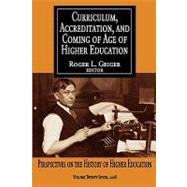- ISBN: 9781412810319 | 1412810310
- Cover: Nonspecific Binding
- Copyright: 4/15/2009
This latest volume in Roger Geigerís distinguished serieson the history of higher education begins with a rareglimpse into the minds of mid-nineteenth century collegians.Timothy J. Williams mines the diaries of studentsat the University of North Carolina to unearth a notunexpected preoccupation with sex, but also a complexpsychological context for those feelings. Marc A.VanOverbeke continues the topic in an essay sheddingnew light on a fundamental change ushering in the universityera: the transition from high schools to college.The secularization of the curriculum is a fundamentalfeature of the emergence of the modern university. KatherineV. Sedgwick explores a distinctive manifestation byquestioning why the curriculum of Bryn Mawr College didnot reflect the religious intentions of its Quaker founderand trustees. Secularization is examined more broadlyby W. Bruce Leslie, who shows how denominational faithceded its ascendancy to "Pan-Protestantism."Where does the record of contemporary events end andthe study of history begin? A new collection of documentsfrom World War II to the present invites Roger Geigerísreflection on this question, as well as consideration ofthe most significant trends of the postwar era. Educatorschafing under current attacks on higher education maytake solace or dismay from the essay "Shaping a Centuryof Criticism" in which Katherine Reynolds Chaddock andJames M. Wallace explore H. L. Menckenís writings, whichaddress enduring issues and debates on the meaning andmeans of American higher education.






